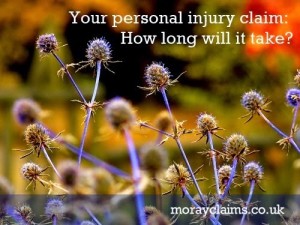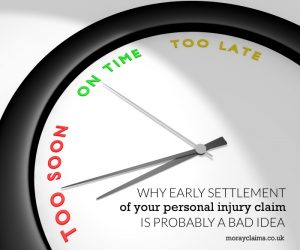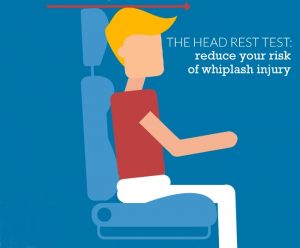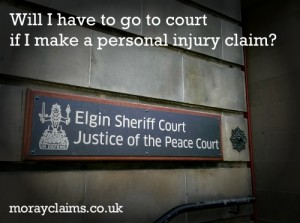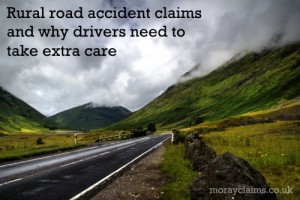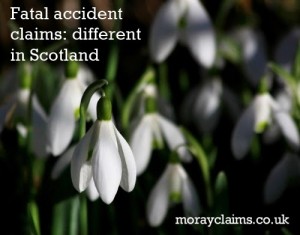We at Grigor & Young / Moray Claims recently dealt with a personal injury claim for a child who had suffered loss of several teeth following a fall in a local-authority-run play park - caused by a defective ground surface. The best settlement offer received from the insurers in negotiations before court action was raised was £750. Raising a court action resulted in a subsequent negotiated settlement of the claim at £25,000 – in other words, 33 times the best pre-litigation offer. Insurance companies are constantly putting forward the line that personal injury solicitors are simply expensive middle men. The insurers maintain that they can themselves fairly assess the compensation that is due and that, if you choose to deal with them directly, you will not be prejudiced. They will negotiate settlement of the claim with you and your claim will not have to go to court. The insurers say that the benefits of this solicitor-less approach go further. If less money has to be spent on Continue Reading
Car Insurance: When the “Best Deal” may be False Economy (If In Doubt – Disclose)
When you’re insuring your car, you’re looking for the best deal and that usually means the cheapest deal. In that environment, it is easy to think that a little 'white lie' about your vehicle or your circumstances will not hurt you if it saves you a few pounds. That is a risky and inadvisable approach, as a recent decision from Greenock Sheriff Court illustrates. The claimant in that case had insured his Audi with Zenith Insurance. When the vehicle was stolen, he claimed on his car insurance for the value of the vehicle. The claim was refused. Zenith said they were treating his policy as void. They refunded the premiums he had paid (amounting to about £1,440) but refused to pay him the value of his car (about £20,000). He sued Zenith for payment of the value of the car. He lost. Insurance contracts are contracts of the utmost good faith Basically, this means that you, as the insured, have a duty to disclose all material or “important” facts that might have Continue Reading
Vicarious Liability: How It Can Help A Work Accident Claim To Succeed
If you have been injured at work by the negligence of a fellow employee or in any situation by a person who was acting in the course of their employment, your claim can be based on what is known as vicarious liability. Often there will be other grounds of claim too but the most common use of negligence as a means of winning an employer’s liability case is vicarious liability. Vicarious liability is the legal doctrine that shifts the blame for an injury onto a person or organisation that did not directly cause the injury but which employed the person who did act negligently. The employer has to take responsibility for the negligence of the employee because the employee is deemed to be an agent of the employer. If an employee is to blame for causing an accident and was acting within the general scope of his or her employment at the time, the injured person will be able to claim against the employer. The theory of vicarious liability is one thing. In practice, it is not always Continue Reading
School Accidents: Three Sides To Every Story
The hysteria that goes along with the so-called “Compensation Culture” is generally nowhere more misplaced than in relation to accidents to children at school. Parents who instruct solicitors to pursue claims for damages for injuries to their children sustained in school will usually only experience disappointment. That’s not say that these claims can never succeed but “health and safety gone mad” tends to crop up a lot in this context. The standard of care expected of a school is that of the reasonable parent. Castle View School in Canvey Island, Essex, has reportedly banned triangular flapjacks after a student was struck in the face by one at break time. Canteen staff have been instructed that in future they must cut flapjacks into squares or rectangles. A spokesman for the school said: "I can confirm that the texture and shape of the flapjacks were reviewed following an isolated accident last week." A spokesman for the Health and Safety Executive said, pointedly: "We Continue Reading
Your Personal Injury Claim: How Long Will It Take?
It is extremely difficult to say how long a personal injury claim will take but the factors involved are not all within the control of the other party or their insurers, despite what some people think. “I know they will probably try to drag it out for years,” is a comment we often hear from people considering making a compensation claim for injuries suffered in an accident. "They" refers to the person or organisation responsible for paying the compensation that is due – which is usually, but not always, an insurance company. Your personal injury solicitor will constantly be keeping an eye on what is the next step required in relation to your claim. At any given time, your solicitor should be able to give a best estimate of how much longer it will all take. Factors which could have an effect on the length of your claim Some things which will affect how quickly your claim can proceed to a conclusion are: How complex the case is; The severity of your Continue Reading
Can I Choose My Own Personal Injury Solicitor?
The answer is generally “yes”. Please read on for an explanation. In many situations if you have been injured as the result of an accident, you will have other property losses that will be insured and you will be contacting your insurers to claim for those. The most common example is road traffic accidents. Your car may well have been damaged and you will contact your insurers to see about repairs or a replacement vehicle. Your motor insurers will these days usually ask you if you have been injured in the accident. If you have been injured, they will refer you on to a specific law firm as if it is “the normal thing to do”. It is important to be aware that there is a financial relationship between the insurers and the solicitors they recommend to you. The relationship operates on the basis that the insurance company agrees to pass on all their claims to the solicitors and the solicitors pay a referral fee for the privilege. It means that the recommendation is not necessarily Continue Reading
Winter driving means an increased risk of accidents: what steps should you take?
Wintry weather is persisting into March around the Moray Firth. Inevitably, in winter, there tends to be an increase in road traffic accidents. At this time of year, we are more likely to be driving in the dark and on roads affected by snow and ice. Repeated freezing and thawing also increases the number and size of potholes in the roads. What steps can you take? Equipment to carry in your vehicle The Royal Society for the Prevention of Accidents (RoSPA) recommends certain basic safety equipment to keep in your vehicle at all times, so you are prepared if the weather deteriorates. This should include a towrope, de-icing equipment, a spare wheel, a torch, a first aid kit and a warm blanket. Checks on the vehicle itself In addition, you should check that your vehicle itself is properly prepared for winter conditions. Check your tyre pressure regularly and ensure that you have sufficient tyre tread as this will reduce the risk of loss of traction and skidding (as well as improving Continue Reading
Why early settlement of your personal injury claim is probably a bad idea
If you have been the victim of personal injury due to the fault of another person or organisation, you will be entitled to compensation. Among other things, you will receive damages for the pain and suffering of your injuries and for any financial loss you have incurred, such as wage loss. There is a process you need to go through to get proper compensation. However, we find more and more that insurance companies tell people in your position that this is unnecessary. It is increasingly the case that injured persons are contacted directly by the insurers for the other person or organisation - with an offer to settle their claim there and then. In some cases, this involves a representative of the insurers “door-stepping” the injured person and virtually bullying them into agreeing. It is all too easy to fall into the trap of believing what is implied in the close attention these insurers pay to you: that they have your best interests at heart. Remember that the insurer’s principal Continue Reading
Whiplash injury: one way to reduce the risks
Whiplash gets a lot of negative press. It is a type of injury where there is scope for people exaggerating their aches and pains to get more compensation or even inventing them completely. The Westminster Government is currently on a mission to weed out spurious claims. On the other hand, if you have ever suffered a whiplash injury to your neck or back, you will know it is not something to be taken lightly. The injury is very real. Whiplash can cause a considerable amount of pain and inconvenience to the injured person. Everyone knows that prevention is better than cure and here’s an idea for simple action you can take to reduce the risk of you being the victim of a whiplash injury. It all boils down to proper adjustment of the head restraints in your vehicle. How best should you position the head rests in your vehicle? It is not sufficient to have a head restraint attached to the top of your seat. You must make sure it is adjusted to be in line with the top of your Continue Reading
Will I Have To Go To Court If I Make A Personal Injury Claim?
Many people worry that, if they pursue legal action, they will have to endure the stress and hassle of a court hearing (known as a ‘Proof’, in Scotland). We get this question time and again: "Will I have to go to court if I make a personal injury claim?" Solicitors and other legal professionals are more used to the court setting, of course, though it is not stress-free for them either. We understand that the prospect of having to go through court proceedings is daunting, perhaps to the point that it may put you off the idea of making a claim entirely. Most claims settle "out of court" It is important not to get too hung up on the idea that your claim will have to “go to court”. The main reason for this is that, in the vast majority of cases, claims are settled out of court – either because it is never necessary to raise a court action at all or because the claim settles after a court action is raised but before the Proof. The parties on each side of the claim will Continue Reading
Rural Road Accident Claims and Why Drivers Need to Take Extra Care
Rural roads account for over 70% of fatal accidents, according to statistics published by RoSPA. In Scotland, trunk roads, such as the A9 and A96, are maintained by independent companies but more minor roads are the responsibility of local authorities. Of course, the more minor roads tend to have a greater amount of bends and ups and downs. The increased dangers for drivers are obvious: whether it’s from other traffic, such as slow-moving farm vehicles, or from the state of the road itself. Roads authorities can rarely be blamed for accidents A Court of Session decision from June 2012 – arising out of a tragic accident in North-east Scotland - has provided a reminder of the considerable limitations on local authorities’ duties and the emphasis that is placed on the personal responsibility of the individual driver. In these cash-strapped times, the duties the law imposes on local authorities to maintain road markings and signage are not likely to increase in the foreseeable Continue Reading
Fatal Accident Claims: Different in Scotland
On 16 July 2009, Peter McGee fell down the stairs at his home in Springburn, Glasgow. Two days later, he died in hospital as a result of complications from his injuries. His wife, Catherine, and other family members raised an action in the Court of Session against RJK Building Services Ltd, who had carried out joinery work at the property on the instructions of Glasgow City Council, Mr and Mrs McGee’s landlords. In an Opinion issued on 18 January 2013, Lord Drummond Young found that RJK were to blame for Mr McGee’s injuries and death because they had been negligent in the way they fitted a handrail on the stairs. The handrail had come loose from the wall as Mr McGee descended the stairs, causing him to fall. A lengthy marriage At the time of his death, Mr McGee was 71 years old. His wife was a few months younger than him. They had been married for 36 years. An area of personal injury law where Scotland is different Personal injury law is applied identically or Continue Reading



